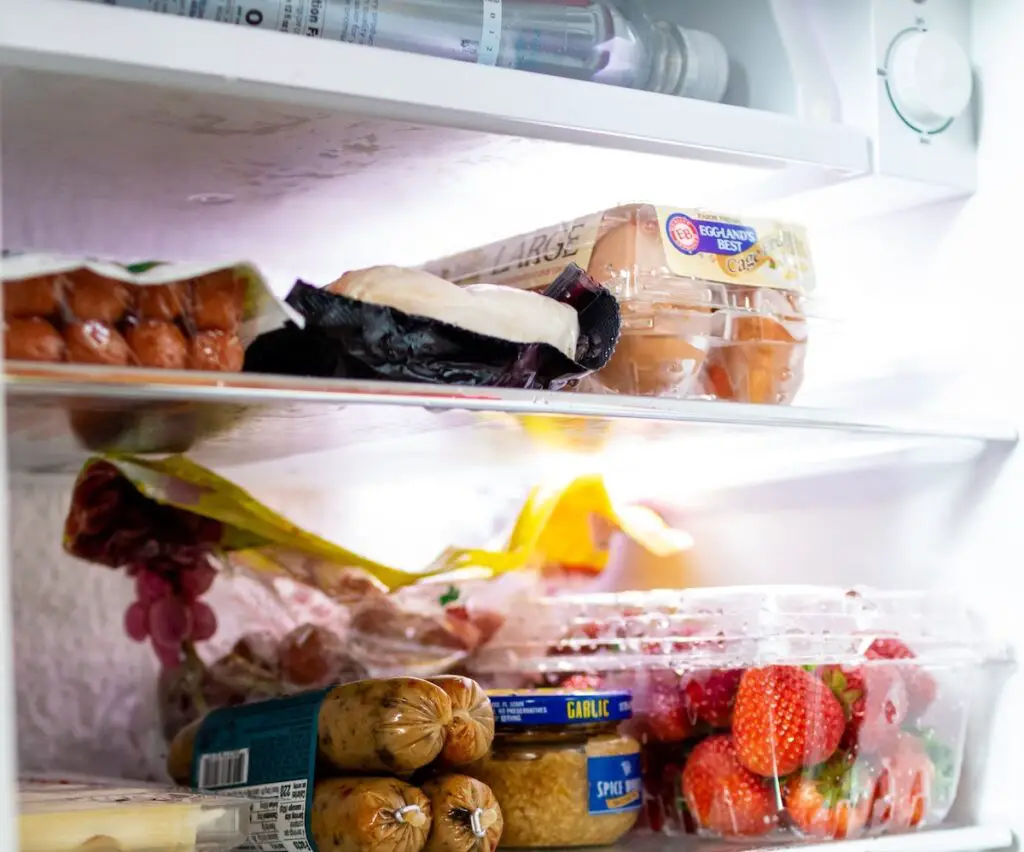Left Eggs Out Overnight on The Counter or Inside a Car
Norah Clark
Can you leave eggs out overnight? No, the USDA recommends not eating eggs if they’ve been left out overnight, but this depends on where they’ve been left and the temperature of the eggs left out overnight.
I’m Norah Clark, an ex-pastry chef! I’ll give you a helping hand today! I was a chef in some of the world’s leading hotels. I can safely say that you are not the first to end up searching for this. I can’t count how many times I have left eggs out overnight unless I was baking a certain item that required the egg to be very near room temperature.
We’ve all had hectic days that ended with something getting left where it does not belong. We’ve all misplaced food items on counters or inside our cars for a long time and even overnight.
We’ll discuss exactly what USDA safety guidelines are for eggs and why certain people might not agree with these recommendations.
Left Eggs Out Overnight – Are They Safe To Eat?
When a raw egg has been refrigerated, it must remain in the refrigerator until it is ready to cook. USDA advises if you left eggs out overnight you should bin them and not risk eating them. If in doubt, throw them out!
How long can you leave eggs out? They should not be kept out of the refrigerator for longer than two hours.
Can eggs be left out of the refrigerator? Once the egg has left a supermarket refrigerator and stays at room temperature or greater could cause the egg to sweat, and the longer an egg is left out it leads to the spread and growth of bacteria.
However, there are numerous instances of bakers and chefs using eggs left out overnight. This depends on the temperature variations within the kitchen, how well you cook your eggs, and cleaning your hands properly after handling them.
I strongly suggest not leaving eggs out overnight unless you are a chef or baker and know what you are doing. Eggs left in the fridge overnight can be safe to consume.
How To Tell If Eggs Have Gone Bad
Ensuring that your eggs are fresh and safe to use is crucial to any recipe. One easy way to check if your raw eggs are still good is through the float test.
There are other signs to look for to determine if an egg has gone bad.
- An easy way to check if your raw eggs are safe to use is the float test. Drop the egg in a glass of water – if it sinks, it’s good to use, but if it floats, it’s not safe.
- You can also shake the egg to check the yolk; if you hear liquid, discard it.
- If the egg smells gassy or sulphuric when cracked, it’s gone bad.
- Since the symptoms of salmonella are not worth the risk, it’s better to be safe than sorry and discard any questionable eggs.
Why Don’t Europeans Refrigerate Eggs?
Many Americans are surprised that Europeans do not refrigerate eggs!
In Europe, food safety experts follow a different approach. They require unwashed eggs, which keeps the shells thicker and prevents salmonella-causing bacteria from entering the eggs.
It’s maybe something we Americans could look into doing in the future!
Left Eggs In Your Car Overnight
There is straightforward safety advice for eggs you leave on the counter overnight. However, if you have left eggs in a car overnight – there is a simple solution.
The average room temperature doesn’t fluctuate excessively. The temperature inside your car, no matter where you live, will likely change drastically from afternoon to evening and throughout the night, and again at dawn. So when the eggs left in a car are taken out, they fluctuate in temperature to the point where it’s not safe to even cook.
The fluctuations in temperature are extremely risky for eggs, and bacteria are likely to grow. When you’ve left eggs in your car overnight or on your drive for over 2 hours, you’re best to throw them out.
If you have left cooked eggs out overnight or in the car, or forgotten your egg and mayonnaise sandwich on the counter at home and left for work – can you still eat them?
I would advise no. Eggs are extremely prone to bacteria growth at any increase in temperature. It’s why you will see cooked egg food items in a refrigerator at gas stations or at the supermarket.
But, Norah, I have only left my cooked eggs out in the car or countertop at home. You can still eat them as long as they aren’t sitting out at room temperature for longing than an hour.
The longer the eggs sit out, the more they deteriorate in quality and start to heat, which leads to bacteria and, potentially, food poisoning.
Leaving Eggs in a Hot Car
Leaving eggs in a hot car (85°F or higher) for 30 minutes causes bacteria to grow on them. Heat can also contaminate farm eggs during transportation and storage, but they may last longer than store-bought eggs.
Always check if your eggs are safe to eat using the abovementioned methods.
Leaving Eggs in a Cold Car
Eggs left in a cold car are safe to eat because a temperature below 40°F (4°C) doesn’t support bacterial growth.
However, if the temperature fluctuates to higher levels for more than two hours, it can cause contamination.
The eggs will last up to five weeks if the car’s temperature is stable.
Can Eggs Go Bad?
Yes, eggs can spoil in a range of different ways. They could be infected with germs, and they may also go rotten, says Southern Living.
Each egg carton will come with an estimated best-by date. If eggs are kept in a refrigerated place at all times and are kept in a cool, dry place, they won’t get rotten or degraded.
When eggs are laid in North America, eggs are cleaned as soon as they hatch to decrease the possibility of contamination by Salmonella.
The washing process is extremely effective. However, it reduces the natural protection quality of eggs, which makes eggs more vulnerable to contamination in the near future.
That’s why eggs are kept cool within North America and certain other countries. So long as eggs are kept cool, the eggs will not be infected with bacteria or multiply. However, the quality will decrease.
The older an egg becomes runnier, both the yolks and the whites will become. This is why you should choose eggs that are fresh to cook or poach. If you’re planning to boil or scramble your eggs, eggs that are older will do the job just perfectly.
How Do Eggs Carry Salmonella?
Salmonella is a kind of food poisoning caused by a type of bacteria that is typically found in animal products.
Eggs can become contaminated by this bacteria the moment they are laid if there are salmonella-contaminated droppings nearby, which is very common.
Salmonella is a common disease that’s easily contracted and simple to treat. When food items are cooked properly, they can kill harmful bacteria, which is why, whether it’s beef or eggs, be sure that you’re not eating any raw food items.
To decrease the possibility of contamination by salmonella eggs, think about purchasing pasteurized eggs. Keep them in a refrigerator and make sure that they’re cooked to the point that they are firm.
How To Store Fresh Eggs
There’s a huge debate on the best way to store fresh eggs. This is particularly prevalent in families that have European relatives. In Britain, as well as many other countries in Europe and Asia, eggs aren’t refrigerated.
The differences in safety standards will be determined by both the poultry as well as those who produce eggs. In the US and others, eggs have to be taken away when they are laid and cleaned to prevent bacteria contamination.
The washing process destroys the natural protective properties of the eggshell. However, to keep them secure from contamination, the eggs must be kept in a refrigerated place at all times.
If you don’t have an egg storage container that can be reused when you’re limiting the time your eggs will last in the refrigerator.
In Europe, as high as 90% of the chickens in Europe are vaccination-free against salmonella, which makes it virtually impossible for eggs to be affected by this bacteria. They aren’t cleaned, and their shells are protected from other harmful substances.
Eggs marked as laid by chickens who have the salmonella vaccine must not be kept in a refrigerator since this could cause them to be more prone to the growth of bacteria.
What do you think that leaves? Do you need to keep eggs refrigerated? Do you have to keep eggs at room temperature?
If you reside in North America, Japan, Australia, Sweden, or the Netherlands, eggs that are commercially produced must be refrigerated. If you’re located in another country, you might not need to refrigerate eggs.
Check the eggs you buy to determine if they come from vaccinated hens. This will help you decide on the best method to preserve eggs.
What do you think of eggs that have been laid from your chickens? This is a difficult problem to resolve. If your chickens aren’t immunized, they and their eggs can still be at risk of Salmonella.
In this way, they must be cleaned prior to being utilized and they don’t need to be cleaned immediately. Once they’ve been cleaned, however, they must be refrigerated.
It is recommended to clean the hands you have touched after handling freshly laid eggs.
You can freeze eggs with shells to prolong their shelf life by up to a whole year.
How To Store Eggs In The Fridge
If you’ve purchased eggs at the grocery store that were chilled, attempt to return them as soon as you can. It’s not recommended to wash eggs as it can destroy the protective properties of eggs’ shells.
Eggs can be kept in their containers to ensure safety and then stored in the fridge towards the rear. A lot of people keep eggs near the refrigerator’s door; however, this isn’t the best option.
The door of your fridge will experience the highest degree of temperature fluctuations, which puts eggs at a greater chance of getting contaminated by bacteria.
The majority of eggs will have an expiry date on the container. It is common for eggs to remain fresh for up to 4-5 weeks in the event that they are kept cold.

How To Store Eggs Without Refrigeration
If you reside in a nation that does not wash eggs or you gather eggs from the eggs of your vaccine-vaccinated backyard chickens, then you can opt not to refrigerate the eggs.
The most important thing to keep in mind is that you always clean your eggs prior to when you make use of them. Don’t wash them afterward and leave them on the counter. Also, make sure to wash your hands following handling eggs that are not washed.
If you plan to keep eggs on your kitchen counter or even a cabinet, it’s best to purchase a storage device designed to keep your eggs fresh.
This will not only protect them from being crushed accidentally and smashed, but it also shields your counter and all of the kitchen appliances from getting contaminated.
Eggs that are not refrigerated will not stay fresh as long as eggs are stored in the refrigerator. Eggs stored outside of a refrigerator must be consumed within three weeks.
How To Store Cooked Eggs
After eggs have been cooked, they must be consumed or chilled as soon as possible. They’ll remain in good condition for three to four days, provided that they’re stored in a sealed container.
Never eat eggs that have been cooked and have been laid in the fridge overnight.
The quality of the eggs you cook will differ based on the method used to cook them. Hard-boiled eggs are typically consumed cold and are considered delicious. Fried eggs are likely to be hard, even if it’s safe to eat.
Scrambled eggs, quiche, and egg casseroles are somewhere between the two. The texture of the dish will change once it’s refrigerated, but not in a very unpleasant manner.
If you have leftover eggs and are stuck for ideas, Ktchn has several ideas for easy ways to use up leftover eggs.

FAQs
Is It OK To Leave Eggs Out Overnight For Baking?
No, you shouldn’t leave eggs out overnight for baking, as the high room temperature can cause bacteria to grow rapidly, increasing the risk of food poisoning. It is best to store eggs in the refrigerator and only take them out just before use.
How Long Can Eggs Be Out Of The Fridge?
Unrefrigerated eggs can last for up to 2 hours at room temperature, after which it is advised to refrigerate them.
Do Eggs Need to Be Refrigerated?
Yes, because refrigerating eggs prevents them from spoiling. Refrigerating eggs helps to slow down the growth of bacteria, which can cause the eggs to spoil more quickly if left at room temperature.
How Long Can Eggs Sit Out
Eggs can sit out at room temperature for up to 2 hours without spoiling, as long as they are kept in a cool and dry place. It is generally recommended to refrigerate eggs as soon as possible to ensure their freshness and to prevent the growth of harmful bacteria.
What Happens If You Leave Eggs In Water Overnight?
Leaving eggs in water overnight can cause the eggs to spoil and develop a bad odor. This is because the water can create a breeding ground for bacteria, which can enter the egg through its porous shell.
Summary
So you will hopefully now know that you should not leave eggs out overnight, as they can only stay fresh for 2 hours unrefrigerated. If you have left eggs in your car for an extended period of time, they must be thrown out as it is not worth the risk of food poisoning.











1 comment
Wonderful information. 70 years old and Never knew this stuff. 😊